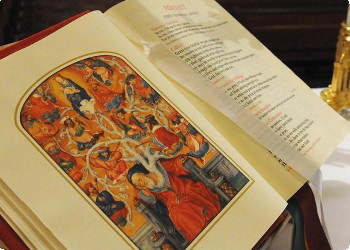Why do you harbor evil thoughts?
5 JULY (Mt 9,1-8)
In the Book of the Levite forgiveness of sins was hard work, and almost difficult. For every sin there was a particular sacrifice to be offered to the Lord. With the prophets forms and manners gradually began to change. Prayer became the form and essence of the cancellation of sins. The Psalms attest to this change. David composed a psalm to ask forgiveness of his fault, the remittance of his transgression.
Be gracious to me, O God, according to Your loving-kindness; According to the greatness of Your compassion blot out my transgressions. Wash me thoroughly from my iniquity And cleanse me from my sin. For I know my transgressions, And my sin is ever before me. Against You, You only, I have sinned And done what is evil in Your sight, So that You are justified when You speak And blameless when You judge. Behold, I was brought forth in iniquity, And in sin my mother conceived me. Behold, You desire truth in the innermost being, And in the hidden part You will make me know wisdom. Purify me with hyssop, and I shall be clean; Wash me, and I shall be whiter than snow. Make me to hear joy and gladness, Let the bones which You have broken rejoice. Hide Your face from my sins And blot out all my iniquities. Create in me a clean heart, O God, And renew a steadfast spirit within me. Do not cast me away from Your presence And do not take Your Holy Spirit from me. Restore to me the joy of Your salvation And sustain me with a willing spirit. Then I will teach transgressors Your ways, And sinners will be converted to You. Deliver me from blood guiltiness, O God, the God of my salvation; Then my tongue will joyfully sing of Your righteousness. O Lord, open my lips, That my mouth may declare Your praise. For You do not delight in sacrifice, otherwise I would give it; You are not pleased with burnt offering. The sacrifices of God are a broken spirit; A broken and a contrite heart, O God, You will not despise. By Your favor do good to Zion; Build the walls of Jerusalem. Then You will delight in righteous sacrifices, In burnt offering and whole burnt offering; Then young bulls will be offered on Your altar. (Psalm 51 (50), 1.21).
With Jesus a radical change takes place. It is he who takes the initiative and without any explicit request, he gives the forgiveness of sin. This offer of forgiveness for the Pharisees is a scandal. No man can forgive sins. Only God can forgive these. These men ignore that God forgives if we forgive, he cancels if we cancel, he forgives if we forgive, he condones if we condone. There is no bigger novelty than this: for God to forgive sin it is required our forgiveness. We are not talking of forgiveness through the sacramental way. We speak of the way that he taught us in “Our Father” and in every other teaching of the Gospel.
He entered a boat, made the crossing, and came into his own town. And there people brought to him a paralytic lying on a stretcher. When Jesus saw their faith, he said to the paralytic, “Courage, child, your sins are forgiven.” At that, some of the scribes said to themselves, “This man is blaspheming.” Jesus knew what they were thinking, and said, “Why do you harbor evil thoughts? Which is easier, to say, ‘Your sins are forgiven,’ or to say, ‘Rise and walk’? But that you may know that the Son of Man has authority on earth to forgive sins” – he then said to the paralytic, “Rise, pick up your stretcher, and go home.” He rose and went home. When the crowds saw this they were struck with awe and glorified God who had given such authority to human beings.
Today Jesus teaches us that sin is not forgiven only through a sacramental way. This way is the sovereign one, for the absolution in the name of God and it is always necessary. However, this is often ineffective if the man does not forgive, does not condone, does not remit the sin of his brother. This path must exist together with the another and it is also sovereign. That is how this way is taught us by St. James: “Is anyone among you suffering? He should pray. Is anyone in good spirits? He should sing praise. Is anyone among you sick? He should summon the presbyters of the church, and they should pray over him and anoint (him) with oil in the name of the Lord, and the prayer of faith will save the sick person, and the Lord will raise him up. If he has committed any sins, he will be forgiven. Therefore, confess your sins to one another and pray for one another, that you may be healed. The fervent prayer of a righteous person is very powerful. Elijah was a human being like us; yet he prayed earnestly that it might not rain, and for three years and six months it did not rain upon the land. Then he prayed again, and the sky gave rain and the earth produced its fruit” (James 5,13-18).
This way must always be lived at all times in every human relationship, if one wants the Sacrament to bear fruit of peace, reconciliation, and great forgiveness.
Virgin Mary, Mother of the Redemption; Angels, and Saints make us people of forgiveness.





